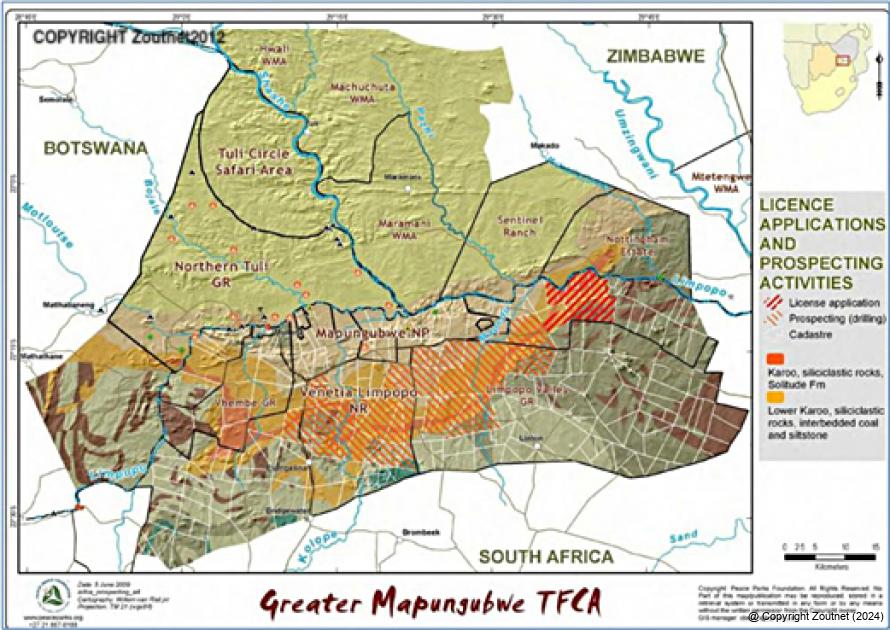
License applications and prospecting activities in the buffer zone of the Mapungubwe Cultural Landscape world heritage site. Graphic: UNESCO and Dag Avango.
News - Date: 09 July 2012
The departments of water, environmental and mining affairs have been criticized by United Nations World Heritage Committee (UNESCO) experts for putting coal mining ahead of the protection of the 1 100-year-old Mapungubwe World Heritage Site.
This was revealed in an unfavourable draft report on Mapungubwe and its future world heritage status during UNESCO’s 36th annual sitting in St. Petersburg in Russia last week. Mapungubwe is one of eight South African World Heritage sites that are protected by an international convention because of its “outstanding universal value”.
The report, among other things, warned that the opencast coal mining by Australian mining giant CoaL of Africa Limited (CoAL) poses a “major threat” to the integrity of Mapungubwe and could result in “unacceptable and irreversible damage” to huge strips of land in the vicinity.
According to the report, a UNESCO investigation team visited the area during January this year and was shocked at how big the Vele mine was. This team included Mr Lazare Eloundou, chief of the African unit of UNESCO’s World Heritage Centre, and Mr Dag Avango, a history researcher from the Swedish Royal Institute of Technology.
They noted, with concern, that the Department of Minerals and Energy had already authorised more than 20 other mine prospecting leases for coal, petroleum and gas in the Soutpansberg area, and that the government appeared to have ignored previous pleas to put the mining on hold by quietly giving CoAL the go-ahead.
Eloundou and Avango further noted that the world committee had asked the government to put a hold on further mining development until a more thorough heritage impact assessment was compiled. They were, as a result, very surprised to find that the Vele mine was already 95% complete at the time of their visit.
Eloundou and Avango stated that it was “crystal clear” that CoAL had resumed its operations and stockpiled large volumes of coal. The monitoring team claimed that they had been presented with evidence that the only reason CoAL was using the more damaging opencast mining method was to save money.
In addition to urging CoAL to revert to underground mining, the team also submitted a draft recommendation urging the government to halt any further opencast coal mining in the Soutpansberg-area. The team also requested the Department of Environmental Affairs (DEA) to submit a copy of its integrated management plan and an updated report on the state of conservation at Mapungubwe for review by 1 February next year.
Eloundou and Avango said they were not happy about the fact that the government did not have a proper buffer zone around Mapungubwe and recommended a seven-kilometre buffer zone around Mapungubwe.
In the meantime, the DEA confirmed in a press release last Thursday that they had taken note of the concerns and recommendations of UNESCO and remained “committed to working with the committee in ensuring effective implementation of the convention, and will be co-operating to provide further information.”









